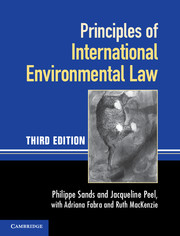Book contents
- Frontmatter
- Contents
- Foreword
- Preface and acknowledgments to the first edition
- Preface and acknowledgments to the second edition
- Preface and acknowledgments to the third edition
- Table of cases
- Table of treaties and other international instruments
- Abbreviations
- Part I The legal and institutional framework
- 1 The environment and international society: issues, concepts and definitions
- 2 History
- 3 Governance: states, international organisations and non-state actors
- 4 International law-making and regulation
- 5 Compliance: implementation, enforcement, dispute settlement
- Part II Principles and rules establishing standards
- Part III Techniques for implementing international principles and rules
- Part IV Linkage of international environmental law and other areas of international law
- Index
- References
3 - Governance: states, international organisations and non-state actors
from Part I - The legal and institutional framework
Published online by Cambridge University Press: 05 June 2012
- Frontmatter
- Contents
- Foreword
- Preface and acknowledgments to the first edition
- Preface and acknowledgments to the second edition
- Preface and acknowledgments to the third edition
- Table of cases
- Table of treaties and other international instruments
- Abbreviations
- Part I The legal and institutional framework
- 1 The environment and international society: issues, concepts and definitions
- 2 History
- 3 Governance: states, international organisations and non-state actors
- 4 International law-making and regulation
- 5 Compliance: implementation, enforcement, dispute settlement
- Part II Principles and rules establishing standards
- Part III Techniques for implementing international principles and rules
- Part IV Linkage of international environmental law and other areas of international law
- Index
- References
Summary
INTRODUCTION
A wide range of actors participate in those aspects of the international legal order which address environmental issues, including the negotiation, implementation and enforcement of international environmental agreements. Apart from the state delegations that play a central role, a visitor to climate change or other negotiations would find international organisations and non-state actors actively involved. International environmental law is characterised by this phenomenon that, with the possible exception of the human rights field, renders it unique. Various reasons explain this state of affairs. States are involved because they are still the pre-eminent international legal persons. International organisations participate because they have been created by states to address particular environmental issues. Of the various non-state participants, the scientific community is involved because, to a great extent, international environmental law is driven by scientific considerations; the corporate sector is involved because of the significant implications which decisions taken at the global level can now have even for individual companies; and environmental non-governmental organisations (NGOs) are involved because they advocate for concerns often not pursued by states and see the need for active participation at the international level as the lines dividing local, national and global issues disintegrate. The participation of non-state actors in international environmental law has an established history, and is widely accepted.
The various actors have different roles and functions, both as subjects and as objects of international environmental law, including: participating in the law-making process; monitoring implementation, including reporting; and ensuring implementation and enforcement of obligations. The role of each actor turns upon its international legal personality and upon the rights and obligations granted to it by general international law and the rules established by particular treaties and other rules. The Rio Declaration and Agenda 21, as well as an increasing number of international environmental agreements, confirmed the central role of international organisations and non-state actors in all aspects of the international legal process.
- Type
- Chapter
- Information
- Principles of International Environmental Law , pp. 50 - 93Publisher: Cambridge University PressPrint publication year: 2012



